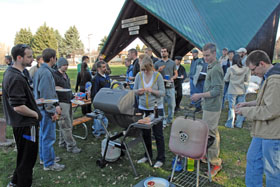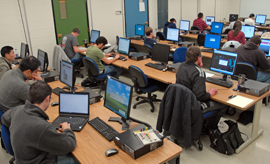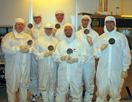FAQs
Frequently Asked Questions by New and Transfer Students

(Also see the MSU Academic Advising Center)
- I have AP (advanced placement) credits from my high school. Will those credits apply to my EE/CpE degree?
- Am I exempt from College Writing I (WRIT 101)?
- How much time will I need to devote to my studies as an EE or CpE student?
- I took the MSU Math Placement Exam but I didn't place into M-171 (Calc I). Can I still be an EE or CpE major?
- What are the Core and Elective course requirements?
- I'm not from Montana: how do I qualify for resident tuition?
- I'm a transfer student. How do I register for classes?
- I have previously taken university courses that I would like to transfer to MSU. Will those credits apply to my EE/CpE degree?
What's special about ECE at Montana State University?




The Electrical and Computer Engineering Department at Montana State University provides you with many advantages compared to other universities:
Exceptional opportunities for hands-on learning
Our programs emphasize hands-onlaboratory work from EELE 101 through graduate school. Our students have access to state-of-the-art equipment and software, including electrical systems, advanced digital design, communications, control systems, and even a fully functional microfabrication clean room facility. Needless to say, MSU ECE graduates have a great reputation for confidence and effectiveness in engineering design, analysis, and troubleshooting.
Learn from outstanding faculty
All ECE classes are taught by experienced professors, not by teaching assistants. Our award-winning faculty are recognized leaders in their areas of expertise, with graduate degrees earned from the best engineering programs in the world. Most instructors also have years of prior industrial experience ready to share with you in our classrooms and laboratories.
Accredited by ABET
The Electrical Engineering Program and the Computer Engineering Program are both accredited by ABET. http://www.abet.org.
Undergraduate involvement in research
Annual ECE faculty expenditures on competitively funded research typically are around $2M, and a good portion of that funding provides scholarships and stipends for students who work part time in research labs and other creative activities that build new knowledge. Don't just read about it--do it!
Spectacular adventures await you, both in and out of class
MSU-Bozeman is minutes away from public trails and blue ribbon trout streams, less than an hour from Big Sky and Bridger Bowl ski resorts, and just 90 miles from Yellowstone National Park. Bozeman also is the home of more than 100 small high-tech businesses and 650 non-profit community organizations. Why settle for a dull college town when you can live and study in the fresh air of the northern Rocky Mountains?
Learn more about Student Life in the MSU College of Engineering.
Does the Department require me to have my own computer?
The MSU College of Engineering does not require each student to own a computer, although an increasing number of our incoming students do arrive on campus with a personal computer. Some students and faculty choose to buy Macintosh hardware, while others choose PCs running Microsoft Windows or Linux. The ECE Department computer labs and most of the other labs on campus are currently equipped with Windows-based PCs.
For the first couple years of college the major software usage will be general word processing, spreadsheets, and internet access, so if you want to buy a computer or laptop before you come we would simply suggest getting Ethernet/wi-fi connectivity, a USB flash drive, and Microsoft Office for compatibility. In general, if you have a computer with internet, word processing, and spreadsheet software you should be in very good shape for essentially all computer needs for the first couple years of the ECE program.
Several specialized software packages for circuit design and engineering mathematics are used in our more advanced courses, and some of those packages have student versions that can be purchased at a reasonable cost. The versions get updated every year or so, so our suggestion would be to wait until the time comes to consider buying a copy of those packages.
What calculator should I buy?
We don't have any exclusive requirements or recommendations regarding calculators, but aiming for something with good scientific support (sin, cos, tan, exp, etc.) and basic graphing should be sufficient. Models like the TI-83, TI-84, and similar calculators from HP and Casio fit this category and would certainly get you through any of the required courses in EE.
At the upper level it is pretty common to do more computation using Matlab, Mathematica, MathCAD, Maple, or another PC-based symbolic software package rather than a hand calculator.
Looking way ahead to your senior year, the required national Fundamentals of Engineering (FE) exam currently has restrictions on what calculators are allowed in the exam room. The current list allows only a few very basic calculators (like the TI-30X) with few features to ensure that no one can cheat on the test. We simply recommend waiting until the time comes before worrying about the FE exam calculator, since the allowable models are relatively cheap--and the list of acceptable calculators may change between now and the time you take the FE exam anyway.
What is the difference between undergraduate majors in EE, CpE, and CS?
The over-simplified summary is that the EE focuses on electrical hardware, CS centers on computer software, and CpE has one foot in digital hardware and one foot in computer software.
The Electrical Engineering (EE) major follows the traditional electrical engineering emphasis on circuits and electrical hardware. Requirements include mathematics (4 semesters of calculus and differential equations), basic science/engineering topics (physics chemistry, mechanical statics and dynamics), electrical circuits, and digital computer hardware.
The Computer Science (CS) Bachelor's degree program options emphasize software skills and knowledge for programming, operating systems, networks, and compilers. The CS degree options require two semesters of calculus and matrix math and 40+ credits of computer science courses.
The Computer Engineering (CpE) degree is similar to the EE degree in its emphasis on mathematics (4 semesters), physics, and electrical and electronic circuits, but also requires a key sequence of computer science classes. In order to accommodate the software courses, the CpE degree does not require chemistry, statics/dynamics, or electrical power classes. Instead, CpE majors take 20+ credits of required and elective computer science courses.
All degree programs at MSU require fulfillment of the University Core 2.0 requirements for breadth of knowledge in the arts, humanities, social sciences, diversity, and creative research.
Can I earn a minor in EE or in CpE?
YES! The ECE Department offers a minor in Electrical Engineering and a minor in Computer Engineering. More information is available here.
Should I try to get a room on the engineering academic theme floor in the residence hall?
Students studying engineering face a challenging academic environment. Many students find it beneficial to be around others with similar academic interests, course projects, and exam schedules. The engineering "academic theme" floors in Langford Hall (men) and Hannon Hall (women) can help you become part of a close community of students who are facing similar educational challenges.
The academic theme floor features 30-50 students majoring in engineering, regularly scheduled in-hall academic advising and study sessions, and access to peer tutoring and additional faculty support.
ECE students come from a wide variety of backgrounds and interests and can find great academic success whether or not they get their start on an engineering floor in the residence halls. But if the engineering theme floor sounds interesting to you, by all means check it out!
Here is an MSU news article about the Women In Science and Engineering (WISE) academic floor in Hannon Hall.
I have AP (advanced placement) credits from my high school. Will those credits apply to my EE/CpE degree?
If you took AP or IB courses during high school, and passed the AP exam with a score of 3 or higher or the IB exam with a score of 4 or higher, that's excellent! These courses can appear on your MSU transcript, and may fulfill some CORE and/or major requirements. See AP course equivalencies and IB course equivalencies to determine what AP and IB courses MSU will accept for degree credit.
Some common AP and IB equivalencies are:
- Calc AB = MSU M-171 (Calculus I) (4 credits)
- Calc BC = MSU M-171 & M-172 (Calculus I and Calculus II) (8 credits)
- Physics C/Mechanics = PHSX 220 (Physics I w/calculus) (4 credits)
- Physics C/Elect & Magnetism = PHSX 222 (Physics II w/calculus) (4 credits)
- IB Mathematics HL = M-171 & M-172 (Calculus I and Calculus II) (8 credits)
- AP Chemistry:
- Score of 5 = CHMY 141 and 143
- Score of 4 = CHMY 121 or 141
- Score of 3 = CHMY 121
Note: Students who score a 5 on the AP Chemistry Exam and who are majoring in the sciences or engineering are strongly encouraged to take the Honors College Chemistry I and II sequence (CHMY 151 and 153).
NOTE that:
- AP Physics B (non-calculus) does not fulfill the ECE physics requirement.
- AP Statistics (non-calculus) does not fulfill the ECE probability and statistics requirement
- IB Chemistry and Physics do not fulfill EE and CpE requirements.
Am I exempt from College Writing I (WRIT 101)?
If your English Composition Advanced Placement (AP) score is a 3 or higher, MSU will accept your AP credits for College Writing I (WRIT 101W/ENGL 121W), and those credits will appear on your MSU transcript.
If you don't have AP English Composition credits, but you scored 28 or higher on the ACT English test, received 650 or higher for your SAT Critical Reading score, have a MUSWA Writing Assessment score of 5.5, or ACT/SAT essay/ writing sub-score of 11, you do not have to take the introductory WRIT 101 class. See the Core section of the MSU Catalog for more information. Instead, ECE students must cover the 3 required credits in English by taking either College Writing II (WRIT 201), Technical Writing (WRIT 221), or some other English composition class agreed upon by your advisor and the ECE Department.
How much time will I need to devote to my studies as an EE or CpE student?
Our guideline, based on many years of experience with hundreds of students, is to multiply the number of academic credits by 3 to get a rough estimate of the number of clock hours necessary each week to keep up with our engineering curriculum. Of course, each student's performance expectations, study skills, and academic level of preparation are unique, but establishing your weekly schedule to accommodate "the factor of 3" is the best way to start.
For example, a 4 credit class such as M-171 Calculus I meets four times per week for a total of roughly four hours of formal class time (four 50-minute lectures each week). However, to succeed in the course the instructor will expect you to spend an additional eight hours per week reading, doing practice problems, visiting the math help center, meeting with a study group, and so forth. In other words, for every hour spent in the classroom you need to budget two hours of additional study time.
Our current recommendation for new freshman is to take at least 14 credits, and academically motivated students should plan on 17 credits. Note that this indicates between 42 and 51 hours per week just keeping up with your studies. If you anticipate needing to hold down a job or have other responsibilities, just be very sure you allocate your time so that you can meet and exceed the academic expectations.
An extremely important hint is to schedule your study time just like you schedule your classes. Identify blocks of time during the day that you will devote to studying, rather than expecting to do all of your studying back at your home or dorm room in the evening. Find a suitable place to study during the open blocks of time between your classes and get in the habit of finishing as much work as possible during those time slots.
I took the MSU Math Placement Exam (MPLEX) and I didn't place into M-171 (Calculus I). Can I still be an EE or CpE major?
Yes, but be sure to note that the EE and CpE curricula are built upon a four semester prerequisite sequence of calculus and differential equations. If you are placed into College Algebra (M-121) or Precalculus (M-151), you will need to pass the sequence of math courses necessary to reach Calculus I (M-171) as soon as you can.
The math classes you take prior to M-171 will appear on your official transcript, but cannot be counted toward your EE/CpE degree requirements.
If you cannot take M-171 the first semester, you should select courses that will fulfill the university "Core 2.0" requirements, or choose classes and electives that do not have a calculus prerequisite (i.e., EELE 261 Digital Logic has no math prerequisite, CSCI 111 has a co-requisite M-151, and professional elective ACTG-201 has prerequisite M-121).
What are the Core and Elective course requirements?
- Approximately 32 credits of elective courses are required for both the EE and the CpE programs. The elective requirements include:
- 12 credits of humanities (H), social science (S), diversity (D), and arts (A) classes as part of the combined university and COE core requirements*;
- 17 credits of professional or mathematics and basic sciences courses selected from the approved list for each major (see EE electives and CpE electives);
- A few professional elective credits may be selected from either the list of approved Professional Electives, or from the list of courses approved by the MSU Core 2.0 committee in the W, A, H, S, D, N, or Contemporary Issues in Science (CS) categories (i.e., another course taken in any Core category except US and Q).
*NOTE that EE and CpE students automatically fulfill the University Seminar (US), Writing (W), Quantitative (Q), Contemporary Issues in Science (CS), and the Natural Science Inquiry (IN) university Core requirements simply by taking the required courses for the major.
Is there a required internship program?
Internships are not required, but we highly recommend that you plan to seek meaningful engineering employment during the summer, part time during the school year, or perhaps by spending an academic term away from school. Employers who visit our campus increasingly emphasize the importance of work experience to complement your academic studies in engineering. Having some real-world experience on your résumé—and a letter of recommendation from an engineering supervisor—can be a great step on the way to landing an ideal post-baccalaureate position. It is also possible arrange to enroll in an internship for academic credit (EELE 498).
The ECE Department and MSU Career Services post information about internships that have been announced by a sponsor, or a student may identify a sponsoring company individually through on-line research, personal contacts, or referrals.
Can I get a scholarship?
MSU, the College of Engineering, and the ECE Department award scholarships on a competitive basis for both new and continuing students. See the online information about ECE Scholarships, the College of Engineering Scholarships, and the Montana State University Scholarships programs. From time to time there are special scholarship announcements: watch for these announcements on the ECE website and via email.
Who is my advisor?
If you are a brand new incoming freshman student or undergraduate transfer student, you can get academic advising information by contacting:
Shelli Spannring
614 Cobleigh Hall
(406) 994-2594
shelli.spannring@montana.edu
https://montana.campus.eab.com/pal/IRvUe1aKkL
Continuing EE or CpE students will automatically be assigned an ECE faculty member as your regular academic advisor. Check the "Advisors" bulletin board on the wall across from the ECE main office, or look in DegreeWorks, where your assigned advisor will be listed in the main program worksheet view.
I'm not from Montana: how do I qualify for resident tuition?
If you are not a Montana resident, state government rules require the University to charge you the non-resident tuition and fees rate--unless you are enrolled in the Western Undergraduate Exchange (WUE) Scholarship program.
If you are a domestic (U.S.) student you can apply to become a Montana legal resident if you follow the mandatory residency guidelines. Note that the residency qualification process takes twelve months and you cannot enroll for more than 6 credits in any term during the twelve month period. You also cannot leave the state for more than a total of 30 days during the qualification year.
International students are always considered non-residents: there is no process to obtain Montana residency without being a U.S. citizen or permanent resident.
Where do ECE graduates go to work? What kind of job will I get when I graduate?
ECE career placement is virtually 100%. EE and CpE Bachelor's degree graduates from MSU find numerous professional employment opportunities, including careers with large, multi-national corporations, local and regional companies, entrepreneurial start-ups, government agencies, or continuing their formal education trajectory in graduate school.
The list of recent employers of ECE graduates includes:
- Micron Technology
- Boeing
- IM Flash Technologies
- HDR
- Astronics
- Advanced Electronic Designs
- Newport/ILX Lightwave
- Navy Undersea Warfare Center - Keyport
- Dynojet
- Northrup Grumman
- Intel
- NASA
- University of Washington
- Cornell University
- University of Wisconsin
- University of Arizona
- Air Force Institute of Technology – Dayton
… and many, many more.
There are also opportunities to expand your career in related areas, including fields like Project Management. Information about job opportunities for individuals with Project Management certification (PMP) is available here: http://www.pmpro.org/jobs/
I have previously taken university courses that I would like to transfer to MSU. Will those credits apply to my EE/CpE degree?
This is a very reasonable and appropriate question, but the answer can be a bit complicated. In general, college-level classes taken at an accredited college or university will be transferrable to MSU degree programs if the course content and prerequisites are equivalent. However, keep in mind that different universities may offer courses with essentially the same name but with differing content, credits, and grading scheme, or you may have taken a course at another university that has no direct equivalent at MSU. It is also possible that you have taken a course that does not fit the specific list of required and elective classes comprising the EE or CpE degree curriculum, and therefore can't apply directly toward the MSU degree program. Each transfer case is different, and we will work with you to ensure that all the equivalent course credits can be transferred under MSU's rules.
Here are a few notes regarding course credit transfers:
- An UNOFFICIAL self-evaluation of course work can be accessed through the Transfer Course Equivalency Guide (available online). The equivalencies listed are updated from time to time, but nevertheless it is a good place to start. If you find that your transfer institution or a particular course is not listed in the Equivalency Guide, it does not necessarily mean that the course will not transfer, just that the information is not yet in the system.
- OFFICIAL evaluations of transfer credits will be processed by the Admissions Evaluator in the Office of Admissions only after ALL FINAL and OFFICIAL transcripts have been received. A final transcript is one that posts ALL graded coursework through your final term of attendance at each institution. Your Admissions Evaluator will determine the equivalency of the transfer course work to MSU in Bozeman. The Office of Admissions also determines which courses fulfill University Core requirements. Courses generally matching in credit amount, level, and content are considered equivalent. Courses not matching are granted elective credit or elective credit with core, and appear on the transfer evaluation with the designation "ELEC."
- Equivalencies for transferring engineering/computer science classes are generally determined by the ECE Department. Once the Office of Admissions has prepared the official transfer credit evaluation, you should make a transfer advising appointment with the Department and bring a detailed syllabus for each engineering course, listing the course topics, textbook used, prerequisites, and any other information that will allow the Department to assess the equivalence.
- The most common transfer equivalency problem for engineering classes lies in the mathematics prerequisites. Specifically, the first electrical engineering circuits class (EELE 201) requires two semesters of calculus and two semesters of calculus-based physics, and the subsequent ECE classes (EELE 203, EELE 308, EELE 317, and EELE 334) all require math prerequisites through differential equations and Calc III. Students who have taken a college physics or general science class that did not have a calculus prerequisite will not be able to transfer those credits toward an EE or CpE degree. Similarly, students who have studied electronics at a technical college, an electrical engineering technology program, or in the military typically have not learned calculus-based circuit analysis, and therefore the ECE Department will not be able to accept those non-calculus circuits and electronics course credits toward the EE or CpE degree.
I already have a two-year A.A. or A.S. degree. Do I need to take General Education Core classes?
If you already have a two-year Associate of Arts (A.A.) or Associate of Science (A.S.) degree from a Montana institution of higher education that included a complete General Education Core requirement (~30 semester credits), you do not need to take any additional lower-division Core classes as part of your MSU degree program. The EE and CpE program requirements of basic math and science courses still must be fulfilled, but the Core category A, H, S, D, US, and W are considered covered by the prior General Education Core taken as part of a Montana A.S. or A.A. degree. An A.A. or A.S. from another state may or may not fulfill the General Education Core: the transfer evaluator in the MSU admissions office will make that determination.
If you have an Associate of Applied Science (A.A.S.) degree, General Education Core classes were likely not included in your degree requirements, so you will need to earn the MSU Core 2.0 credit requirements.
Please refer to the complete Montana University System general education transfer policy for more information.
I already have a four-year baccalaureate (BS/BA) degree. Do I need to take General Education Core classes?
If you already have a prior bacalaureate (BS/BA) degree from an accredited institution, you do not need to take any additional lower-division Core classes as part of your MSU degree program. The EE and CpE program requirements of basic math and science courses still must be fulfilled, but the Core category A, H, S, D, US, and W are considered covered by the prior General Education Core taken as part of the prior degree.
Please refer to the complete Montana University System general education transfer policy for more information.
I'm a transfer student. How do I register for classes?
First, make sure the Office of Admissions has completed your application process and performed the official Transfer Equivalency review.
Next, spend some time reviewing the MSU policies, degree requirements, and procedures applicable to your particular transfer situation. Then attend the regularly scheduled formal group orientation offered before each term, or make an appointment with the ECE Department to schedule an individual advising appointment.
To make the advising process quick and efficient, please be sure to bring a copy of your grade transcript, ACT/SAT scores (for math placement, if necessary), and complete course syllabi and content details from previous schools to show your previous engineering/math/science course experience.
Once your advising/orientation session is complete, you will be given the online personal identification number (PIN) needed to register for your classes.
